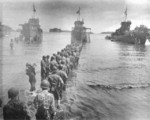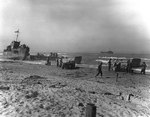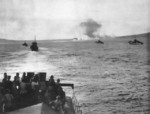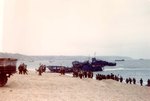LCI(L)-class Landing Ship
| Country | United States |
| Displacement | 257 tons standard; 385 tons full |
| Length | 160 feet |
| Beam | 23 feet |
| Draft | 5 feet |
| Machinery | Eight GM diesel engines, 2 shafts |
| Power Output | 1,600 shaft horsepower |
| Speed | 15 knots |
| Range | 4,000nm at 12 knots |
| Crew | 24 |
| Armament | 4x20mm Oerlikon Mk 4 automatic cannons |
| Cargo Capacity | 200 passengers or 75 tons of cargo, plus 110 tons of fuel, 240 gallons of lubricating oil, and 37 tons of fresh water |
| Note | Specifications provided are of the LCI(L)-351 sub-class |
Contributor: C. Peter Chen
This article refers to the entire LCI(L)-class; it is not about an individual vessel.
ww2dbaseEarly in the European War, the British drew up a requirement for a design tentatively named as "Giant Raiding Craft", or "GRC". It was envisioned that large craft around the size o 150-feet in length would be able to deliver 200 soldiers directly to beaches up to 230 miles away from the United Kingdom to conduct occasional raids, which would attempt to tie down a significant German presence in occupied France to defend against such raids. As the development was underway, the British approached the United States Navy for potential construction contracts, but the US Navy was not interested. The United States Army, with its own need for landing craft, accepted the joint venture. The final design came out to be a craft with length of 160 feet, beam of 23 feet, forward draft of 2 feet 6 inches and stern draft of 4 feet 5 inches. The craft was designed to carry a crew of 24 (3 officers and 21 enlisted) and either 188 passengers (6 officers and 182 enlisted) or 75 tons of cargo. In addition to the cargo or passenger space, holds belowdecks were also capable of holding 120 tons of fuel, 240 gallons of lubricating oil, and 36 tons of fresh water each landing craft. The craft's design was kept very simple in order to speed up construction, thus the shape of the craft boxy. Initially, they were envisioned to be completely unarmed, but it was soon realized that it was unrealistic to assume that these transports did not need to be armed, as they would come under fire as they disembarked troops on hostile beaches. They were thus provided with light anti-aircraft armament consisted of four or five Oerlikon 20-millimeter Mk 4 automatic cannons. Some of them had a Bofors 40-millimeter cannon on the bow for greater firepower. The British planned to substitute in two 0.303-inch Lewis Mk I machine guns for air defense.
ww2dbaseThe first contract was officially signed with George Lawley & Sons Shipbuilding Corporation (Neponset, Massachusetts, United States) and New York Shipbuilding Corporation (Camden, New Jersey, United States) on 3 Jun 1942, and production began in the following month, and shortly after the design was designated "Landing Craft, Infantry (Large)", or LCI(L) or even simply LCI for short. The first prototypes were launched, LCI-1 and LCI-209, and were tested in Sep and Oct 1942. In late 1942, a group of eight LCIs made their first journey into the Atlantic Ocean from Norfolk, Virginia, United States to Bermuda Islands; they weathered Force 4 winds, proving themselves seaworthy, though they also rolled badly. 299 of the LCI-1 sub-class landing craft were built; 45 in-progress LCI-1 sub-class craft were canceled in order to speed along the improved LCI-351 sub-class. 211 of them were transferred to the British Royal Navy under the Lend-Lease program.
ww2dbaseThe LCI-351 sub-class landing craft had better accommodations and larger work areas for troops and crews, the hatches were enlarged to accept litters, and the bridge structures were rounder (bridge structures of the LCI-1 sub-class were rectangular). Their holds belowdecks held roughly the same amount of fuel and water as their predecessors (10 tons less fuel but 1 ton more water). The first LCI-351 sub-class landing craft was laid down on 5 Mar 1943, launched on 8 Apr, and commissioned on 14 May.
ww2dbaseBecause LCI landing craft were designed to be versatile craft capable of sailing in shallow waters, and were already built to be able to withstand some enemy fire, some of them were converted so that they could serve as fire support craft. These converted landing craft carried a wide array of armaments such as 3-inch guns, 5-inch guns, 4.2-inch mortars, 4.5-inch barrage rockets, and 5-inch barrage rockets. Some of the other variants include command craft, ammunition transports, and home vessels for underwater demolition teams.
ww2dbaseThe first combat mission that employed LCI landing craft was the Operation Torch invasion of North Africa in Nov 1942, where the British Royal Navy LCI craft sailed directly from the United Kingdom, while the American ones island hopped across the Atlantic Ocean. The first use of LCI landing craft in the Pacific War was during the Jun 1943 landings in New Georgia, Solomon Islands, where they delivered second and fourth echelons of troops to the islands. They were valued for their ability to travel in shallow areas of water at the atolls where the larger LST transports could not, and they were able to economically deliver small forces to remote island areas. They were also used during the invasion of Sicily, Italy in Jul 1943, where they landed troops during the pre-dawn hours while facing hostile fire. Back in the Pacific Ocean, in Jan 1944, the invasion of Kwajalein in the Marshall Islands were supported by 12 LCI(FS) craft, which were LCI craft fitted out with rocket launchers. While the rockets did not necessarily cause significant damage, nor the guns and cannons that opened up after the rockets, but they were valued for their demoralizing effects on the Japanese as well as to rally the spirit of the invasion troops about to disembark onto hostile beaches.
ww2dbaseThus far, landing craft of both sub-classes featured ramps on either side of the bow for troops to disembark. A third sub-class, LCI-402, featured centerline bow ramps similar to those of the LST landing ships. After 1 Jun 1944, all LCI landing craft being constructed were equipped with bow doors.
ww2dbaseDuring the Okinawa campaign, 42 LCI(M) craft (equipped with mortars) supported the initial landings, firing 28,000 rounds on a strip 5.5 miles wide and 300 yards deep during the first hour of landings. As the fighting moved inland, they tend to circle around radar-equipped larger ships such as destroyers, and when called upon, the radar-equipped ships would relay the direction and distance of targets to the LCI(M) craft, which then would loose barrages of mortar shells at the suspected Japanese positions.
ww2dbaseIn early 1945, 25 LCI landing craft were transferred to Russia. The Russian crews that later manned these landing craft were trained by United States Coast Guard personnel at Cold Bay, Alaska, United States.
ww2dbaseAfter the war, most LCI landing craft were inactivated by the Royal Navy and the US Navy within the first two years, though a few were used during the Korean War and a very small number of fire support craft were used during the Vietnam War. Most of them were scrapped, sold to foreign navies, or sold into the civilian market.
ww2dbaseSource: Landing Craft Infantry and Fire Support.
Last Major Revision: Nov 2009
LCI(L)-class Landing Ship Interactive Map
Photographs
 |  |  |  |
Please consider supporting us on Patreon. Even $1 per month will go a long way! Thank you. Please help us spread the word: Stay updated with WW2DB: |
Visitor Submitted Comments
7 Feb 2011 04:22:13 AM
My father commanded LCI(R)1024 at Okinawa during WW2. Your site was a grest help, thanks!
8 Mar 2011 05:37:36 PM
Anyone have any information on LCI(L) 223 commanded by Ens Johnson in the Pacific. He is a relative of my wife.
20 Aug 2011 11:59:19 PM
My Dad was the electricians mate on LCI (L) 497 and trained on the 511 at Soloman.
If you served with my father, Carl Lantzy, please drop a line and I'll pass it along.
Thank You,
Mike
13 Dec 2011 01:38:39 AM
Check out the LCI 713. The Amphibious Forces
Memorial Museum is working on the restoration in Portland OR
8 Feb 2012 02:41:08 PM
I'm looking for any information on the Destroyer DD-334 during the world war2 My dad's name was Seaman first class USNR C2837994 Leonard martin Zehr. He hold havee been under E.w. Springer Lieutenant (JG) around 1946. His ship's #982 or USS CORRY- Destroyer DD-334. the otherninformation that I have is Great Lakes Illinoise and PHIB. TRA BASE SOLOMONS. so if any of this information is of any help, I would like to know what information you have on my DAD, or his ship, or if you have any pictures of my DAD's ship, I would gretly appreceiate any information you can give me, or if you have any information on any other web-sites I could try looking at. Thank You,KIM ( ZEHR) GOODMAN
7 Sep 2012 03:26:07 PM
More information I found about the desstroyer my DAD,Leonard M.Zehr was on back in ww2 is as follows; USS LCI (L) 982 .....He was in there until around may 17 1946. The LIEUTENANT (J.G.) USNR E.W. SPRINGER. If you know anything about this ship,or have any pictures of this ship please send me the information to my Email= ktgman@psci.net I THANK YOU,and THE ENTIRE UNITED STATES OF AMERICA THANKS YOU. Also, may GOD BLESS YOU ALL WHO HAD TO FIGHT DURING THIS TERRIBLE TIME
21 Mar 2013 02:38:46 PM
Seeking information about LCI 511 at Normandy. My uncle, Gilbert Toon, served aboard, possibly as quartermaster. Any assistance appreciated.
14 Jun 2013 11:56:34 AM
My uncle Nicholas Frank Kauten Jr.
Also was on LCI 446 in WW II.
I m also looking for photos and history.
THanks for any and all help i can get
John Kauten
jkcoffee2@verizon.net
8 Apr 2014 01:17:31 PM
Reply to #8. I have an artifact from the LCI(L)511.
belonged to the Pharm mate Cardarelli. the 511 was one of three US LCI(L)'s helping land Canadian troops at Juno beach.
do you have any pictures of the ship?
1 Jun 2014 07:56:15 PM
too am looking for information on LCI (L) 223. Any information about this landing craft would be greatly appreciated. Thank you.
12 Jul 2014 11:53:07 PM
Yes, Christine, I have information on LCI (L) 223. My uncle was on it when it was hit on 6 June 1944. You are welcomed to contact me directly at johnaheald@gmail.com or (504) 844-8203. I have information that I have gathered through research as well as letters.
19 Aug 2014 11:56:01 AM
My DAD Charles Hawkins served on LCI 867 ???
6 Sep 2014 01:42:31 PM
Looking for any info on the USS LCI(X)784. It was my fathers ship during WW2 he was the radioman.Does anywone know what the X stands for?Any help Thank You
15 Nov 2014 09:31:47 AM
Any information on LCI(L)-658 It was also designated as LCI(M)-658 and LCI(I)-658
My father was on that ship, any information at all would be appreciated. Thanks,
25 Sep 2015 07:08:54 PM
We snorkeled a sunken ship in the san blas islands of panama. I am reasonably certain it was an LSI as both sides of the bow were cut back as to accommodate landing ramps.
The locals said it had been used to transport liquor when it sank in shallow water.
1 Feb 2016 11:41:42 AM
I'm looking for a picture of the LCI459 for my father-in-law if there is anyone out there that has one please send a copy. Thank You
7 Nov 2016 09:21:20 AM
Seeking information on LCI (L) 7. Lost off the coast of Algeria.
Appreciate.
18 Apr 2017 02:54:36 PM
I'm looking for a picture of the LCI
L-459 for my father was on
15 May 2017 01:55:54 PM
My Grandfather was on the LCI-459 and was one of 2 men aboard that was injured when it sank off of Palau island. He received the purple heart. His name was Calvin Shotwell. I will see if my grandmother has his pictures still.
2 Jul 2017 01:55:08 PM
my uncle leading stoker john thomas moseley served on lci 212 and 313
10 Aug 2017 06:51:03 AM
My Father Carroll Key Wood was on LCI (L-413) looking for anyone who also had relitives on same and any pics
1 Sep 2018 12:14:37 PM
My dad was on two LCI ships. LCI 660 and also LCI 606. I believe both were fire support.
29 Mar 2019 11:23:03 AM
Looking tgo talk with Mr. Turner. My father was on LCI-660 Would like a picture of the ship if possible and to talk
23 Nov 2019 05:41:37 AM
My father served on LCT #342, LCT(5) Flotilla 10 during a Sicily landing on August 8, 1943. He also
served on USS LCi(L) 1032. If anyone has information regarding these ships, their service, pictures, etc. I would appreciate to hear from you.
11 Aug 2020 08:06:33 PM
Are you aware of the Amphibious Forces Memorial Museum? They have the LCI 713 in Portland Oregon.
Also the USS LCI National Association.
Google for web address.
12 Dec 2020 03:19:17 PM
Looking for information on crew of USS LCI (L) 980. I have record of Hayes Deel (or Deel Hayes) who served aboard her. Any info would be appreciated.
30 Aug 2023 02:48:45 PM
My great uncle, LT. Wilbur T. Osborne USNR died 2 weeks ago. He was the skipper on USS LCI (L)-810. If any members of his crew are still living and read this site, I wanted to let you know. He was 106 years old. Any history on this ship would be greatly appreciated. Regards, Craig
All visitor submitted comments are opinions of those making the submissions and do not reflect views of WW2DB.

» Landing Craft, Infantry and Fire Support
- » 1,176 biographies
- » 337 events
- » 44,933 timeline entries
- » 1,245 ships
- » 350 aircraft models
- » 207 vehicle models
- » 376 weapon models
- » 123 historical documents
- » 261 facilities
- » 470 book reviews
- » 28,471 photos
- » 365 maps
Joachim von Ribbentrop, German Foreign Minister, Aug 1939
Please consider supporting us on Patreon. Even $1 a month will go a long way. Thank you!
Or, please support us by purchasing some WW2DB merchandise at TeeSpring, Thank you!
15 Jun 2010 09:59:08 AM
My dad was on LCI 446 in WW II. I am looking for photos and history.
Thanks,
Roscoe Meek